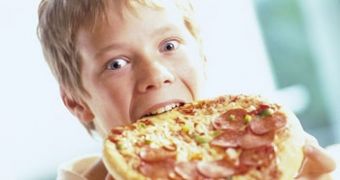The alarming rate of obesity in children has become a widespread issue, often attributed to unhealthy eating habits, combined with an increased consumption of sugar-sweetened drinks. While this still holds true, a new study comes to show that fast food is also directly linked to happiness in children, as physorg informs.
Professor Hung-Hao Chang from National Taiwan University and Professor Rodolfo Nayga from the University of Arkansas in the US analyzed data gathered by the National Health Interview Survey in Taiwan (2001) and compared the levels of obesity and those of happiness in 2,366 children, aged 2-12. The findings of the study are published in the Journal of Happiness Studies, and clearly indicate that children who eat junk food and drink soda are less likely to be unhappy.
Specific numbers reveal that a quarter of the kids included in the study were obese and overweight, with 19 percent of them all saying they often felt depressed, sad or unhappy. The conclusion that the researchers came to is that consumption of junk food and sweetened beverages leads to obesity in children, but also decreases the odds of unhappiness. At the same time, researchers also say that the consumption of junk food and soda can be influenced by parents, in that a mother’s eating habits can predict similar eating patterns in the baby.
Moreover, the same study reveals that children who eat unhealthy food, which includes pizza, hamburgers and French fries, are also most likely to drink soda as well. Similarly, it’s children who come from lower income households who are more prone to unhealthy eating habits, therefore to be more obese or overweight, as opposed to those whose parents are better off from a financial point of view.
Also on the topic of childhood obesity, just recently, backers asked for a governmental tax on soda and sugar-sweetened beverages, as a means to combat the epidemics by reducing consumption via a higher price tag. Sweetened beverages “may be the single largest driver of the obesity epidemic. The strongest science exists on soda and sweetened beverages. Those studies are quite consistent in showing a relationship between soda intake and bad health outcomes.” Prof. Kelly Brownell, director of the Rudd Center for Food Policy and Obesity at Yale, was saying at the time, pointing out that advertisements for such beverages usually target children.

 14 DAY TRIAL //
14 DAY TRIAL //